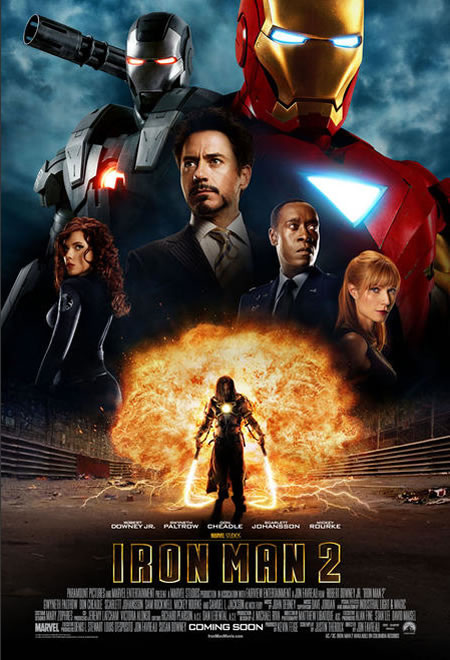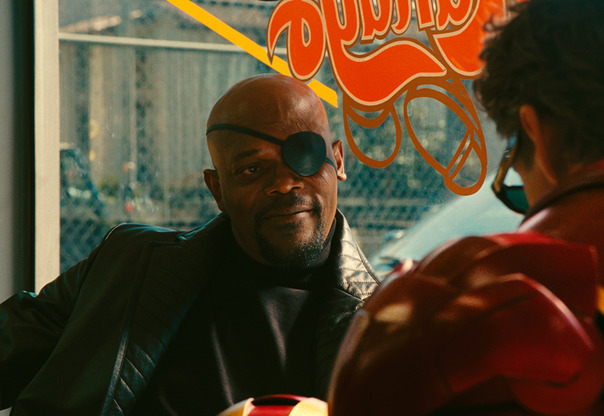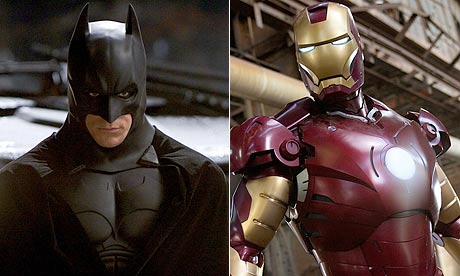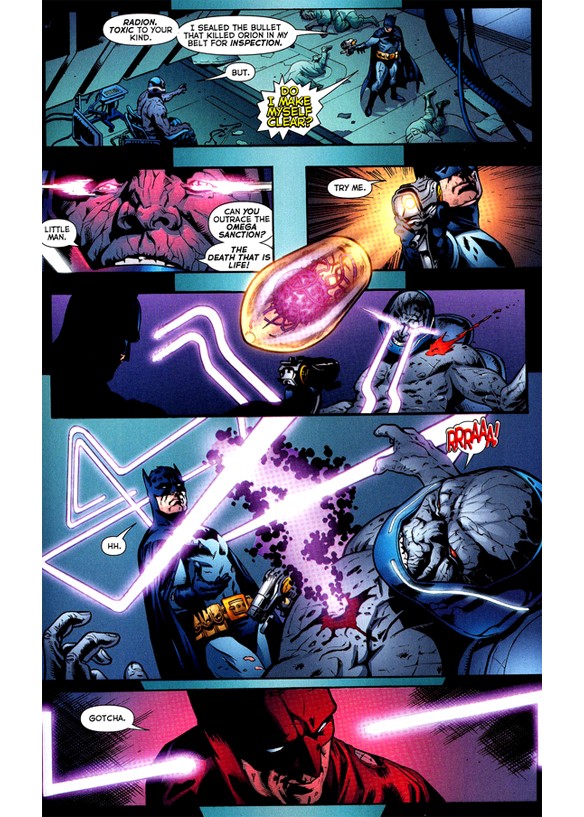I saw “Iron Man 2” last night, and while it’s not a groundbreaking landmark in filmmaking history, I thought it was a darn good action flick. I laughed, I thrilled to the excitement, I got pumped up and I even got a little emotional, but most importantly, I left happy.

However, I think the most interesting—and encouraging—thing “Iron Man 2” did for me happened after I left the theater. The film had actively engaged my nerd brain to the point where I ended up turning over numerous thoughts about the character of Iron Man and, furthermore, the universe he resides in before branching out to comparisons between other fictional worlds. That’s the mark of a good comic flick, in my estimation. It gets you excited to think about superheroes again.
Now, I won’t claim to have mulled over anything so earth-shattering as to crack the internet in two with profound observations, but it’s the bullshit philosophical and analytical conversations about comics that not only—in some twisted way—justify the amount of brain space I’ve devoted to men and women in tights as well as their fictional and behind-the-scenes history, but also makes being a nerd a whole lot of high-falootin’ fun. So, bear with me and I’ll run through the mental paces of the path “Iron Man 2” put my mind on.
In looking at “Iron Man 2,” it would seem that a many of the moments geared toward building a bigger Marvel movie universe were among the film’s weakest. While they didn’t really bother me, they were mostly unessential to the “IM2” storyline and at times detracted a bit from the the focus of the film. Marvel Studios’ ambitious undertaking of making a superhero team-up movie with “The Avengers” makes any lack of focus due to big picture stuff forgivable—they’re figuring it out as they go and could be doing much, much worse with it— but it’s clear “Iron Man 2” was the film that had to suffer the initial growing pains of one of the biggest projects in Hollywood history: essentially a crossover quadrology of three blockbuster films leading to a fourth blockbusting mega-film. Plopping these world-building threads into “IM2” makes more sense than relying on “Thor” or “The First Avenger: Captain America” to do so because Tony Stark and his world were so thoroughly established in “Iron Man.” Like I said, it’s a big challenge and Marvel Studios could be doing much, much worse.
I think placing these moments within the framework of “IM2,” while maybe a hindrance to the film’s focus, worked well to help establish one of the main aspects of Tony Stark’s character that make him compelling. Iron Man is the ultimate pragmatic super hero. He’s a problem solver of a mental capacity so great that he literally has to solve the world’s problems because all other problems are below him. Given, Tony’s a free-wheeling and egomaniacal rogue who’s not used to playing by anyone else’s rules, but when Nick Fury starts putting the big picture in front of Stark, you can almost see the wheels begin turning. There’s a problem and Tony’s brain can’t help but to start solving it.

It’s the problem-solving nature of Iron Man that I think makes him really work as a character. He’s a genius, but in a relatable way. Tony Stark can handle super science and space aliens, but he’s also Mr. Fix-It. He’s practical. He’s one-part Howard Hughes, all money and grand schemes, and one-part everyman, enjoying women and getting the job done with hard work and ingenuity. For this reason, Tony Stark having some of the Marvel movie-verse’s problems presented to him makes sense to me. He’s a smart, powerful and rich businessman on top of being a superhero. Silly as it sounds, he’s—in theory—as realistic as superheroes come. Tony Stark is Steve Jobs if Steve Jobs made armored exoskeletons instead of iPads… you know, except he’s richer and fights supervillains. With that being the case, real world problems like terrorist Russian scientists and arms races seem like logical nuisances for the man with best tech and most influence in the world for a private citizen. It’s logical, political and still fantastic. Like all good sci-fi or fantasy, it’s a character that belongs in a world that is constantly a metaphor for our modern world and with Iron Man—in recent comics and movie history—it works.
A lot of what I’m saying here about why Iron Man is a hero who enthralls me could be flipped and used as arguments as to why Batman doesn’t. While we’re talking comics here and a huge suspension of disbelief is necessary to enjoy all things superheroic, Iron Man is still a character I can rationalize while Batman is not. Tony Stark is Howard Hughes twisted into a savior of society via technology and heroic actions; he’s the extrovert playboy superhero, if you will. Batman is all that potential folded in on itself, living in a cave and wreaking psychological havoc on villains at night after his own psychological trauma inflicted his need for justice. The point is, Tony Stark’s looked outward and used his genius to shape the world, Batman’s looked inward and used his genius to change the world on an alley by alley basis. Two sides of the same coin, maybe? I’d love to see the team-up crossover series.

Anywho, as I keep rambling on here, comparing Iron Man to Batman inevitably leads to the Marvel versus DC argument, and growing up a Marvel kid, I still relate better to that universe. Again, I think this has to do with the ability to rationalize things, which is a personal process but still an essential one when it comes to enjoying any story. Marvel is built upon a series of characters who were used to comment on the issues of the day and have adapted over time to make sure they are relevant and pertinent to modern society. DC has built their universe on history and tradition, which doesn’t always allow them to tackle today’s news in as poignant a way. I mean, when you really break it down and look at the DCU, there are so many tiny snafus that I can’t see past in my rationalization process. If Gotham is more or less the size of New York and only a short jaunt down the coast, than how huge is DC’s East Coast? That said, if extra cities like Metropolis, Central City, Opal City and Star City, among others, are part of the U.S. map alongside well-known places like Chicago and Los Angeles, well, what does that mean for the economy and population of this fictional United States? Sounds like a complication of real world issues that Tony Stark would be the perfect man to tackle.
Now, those “faults” of DC addressed, it’s those very questions that intrigue me most about their comic universe. Instead of inserting superheroes into our world, like Marvel does, they have built a similar world that’s so different it’s almost another language. In fact, I think one could argue Marvel and DC’s universes are almost hardly comparable based on the Marvel U’s constant state of allegory while DC is a framework of created history reflecting a cycle of events uninfluenced by anything outside its own sphere. It’s apples and oranges in so many ways. They’re both fruit, but share few similarities beyond that…
…one could argue, at least…
I find these inherent differences in the Marvel and DC universes, that I see at least, lead me to desire very distinct kind of stories from each company. Matt Fraction’s “Invincible Iron Man” has been a close-to-perfect run with Tony Stark dealing with numerous political and industrial issues that have resonance with our hyper technology-infused modern world. Pull that kind of tale with The Atom or Cyborg and it’s not going to work for me. It’s why I can’t get into anything the Sentry does in any of the Avengers books. For all their outlandish adventures, the modern Avengers are very much grounded in reality. The Sentry, like Superman, is too bombastic for their world. (Just a quick note: Please keep in mind that “suspension of disbelief” line I dropped earlier. It’s key in reminding you all that this entire thought process needs to be taken with a very, very nerdy grain of salt.) DC has created a universe where Batman and Superman can co-exist logically, Marvel has created one where Iron Man and Daredevil can do the same. Similar but oh so very different. Ed Brubaker’s “Captain America” worked so well for me because it not only intertwined itself with real history but it played off the fictional science of Cap’s comic history to create a legitimately compelling story. That comic science in “Cap,” however, was explained in a way to make it fit with Marvel’s more grounded superhero universe. They used their modern day-infused world to tell an outlandish story that fit within its rules. Yet, at DC, where New Gods exist and Darkseid can take over the world with an “Anti-Life Equation” it seems entirely plausible that firing his Omega Sanction into Batman’s chest would send Bruce Wayne back in time. Within DC’s universe, the idea of Batman fighting his way back from the past after what happened in Grant Morrison’s “Batman” and “Final Crisis” seems appropriately outlandish while still fitting into the rules of that world. One isn’t right while the other is wrong, each universe is just different. In the end, I think that’s why I like different stories and different types of stories from each company. Their divergent mythologies don’t necessarily allow the same type of storytelling to work no matter what happens, so seeing something done well at Marvel or DC isn’t solely a framework that could transcend either world. It’s viewing how Marvel and DC use their own rules and “science” to tell a story that works within each world that really entertains me.

In closing, I think this rambling internal debate brought to blog is really one of the best testaments I can give to the quality “Iron Man 2.” It’s easy to screw up these characters with decades worth of history for someone who’s dedicated a lot of time to reading about the plethora of extraneous tidbits near-countless comic issues contain. It’s also hard to get these movies right. However, to get put forth a film that got me thinking—and, via blog, talking—about the storytelling capabilities of this character and the mythos surrounding him, not to mention how that relates to the world of comics and storytelling in general, is truly a success. “Iron Man 2” may not have been the best comic film ever, but it got me discussing and debating it both internally and externally in a way that only the best comic books do—and that’s saying something.

Dude, just how many cups of coffee did you consume after seeing this movie? Wow!
Most of my friends thought it was typical of a sequel movie. Most of them felt it had funny moments, action and lots of product placement to generate profit. Everyone says it was an okay movie, but certainly not a great movie. It certainly didn’t leave them excited to see a third one…
I think the comic book movies are starting to become a little over exposed. They’re being pumped out right now like oil into the gulf and interest is going to start waning. I think they need to be better paced before they outstrip the market’s interest.
I think this movie showed you can do these movies more like chapters of a larger story and it can work. It wasn’t perfect, but I’m certainly curious to see where they go with “Thor,” “Cap,” “Avengers” and eventually “Iron Man 3.” Makes the whole deal a bit more like comics, which are pumped out month after month… so… getting one or two of these bad boys a year is fine by me.
Ditto on the sequel thing… It’s usually a studio’s ‘holy crap I can’t believe that made so much money moment’– hopefully they make up for it with the final film as they did with the spiderman series… The matrix series sucked. I think everyone was suprised with how good iron man turned out the first time around– even marvel!
Oh yeah, I think everyone was pretty surprised the first Iron Man flick was so well-received. And round two for IM wasn’t bad at all, but I wouldn’t say it was better than the first movie… but, ya know what? I’m ok with that. The second film was another movie that kept the ball rolling nicely without ruining the whole thing. Plus, it got me excited to think about superhero stuff and didn’t have me leaving the theater thinking about everything it fucked up (“X-Men: The Last Stand,” I’m looking at you!), so I’m a happy camper.